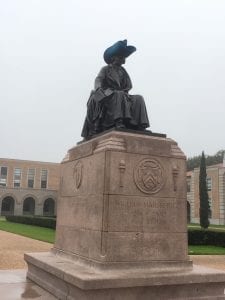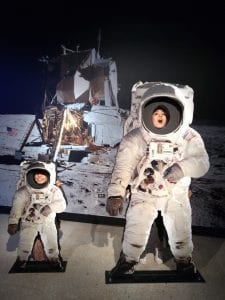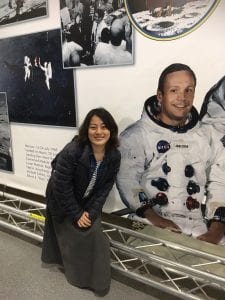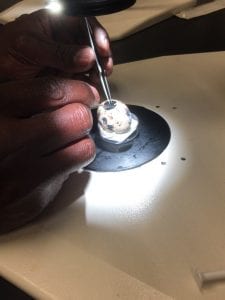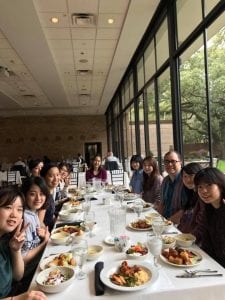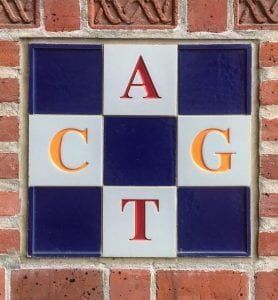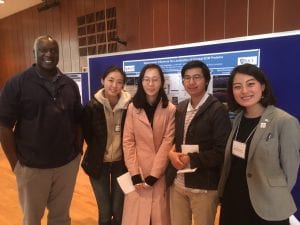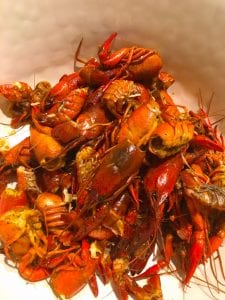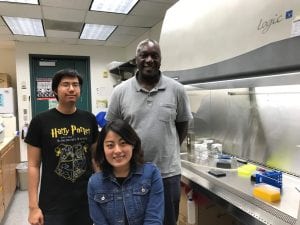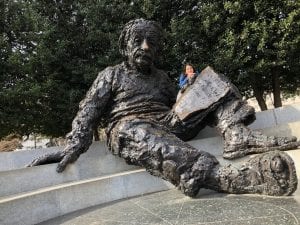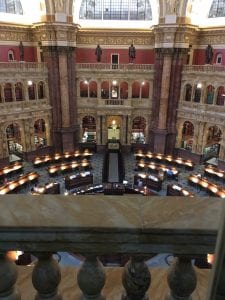[:en]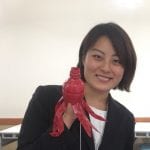 Ayaka Kasamatsu
Ayaka Kasamatsu
Hometown in Japan: Tokyo
University in Japan: The University of Tokyo
Major & School Year: Biology, B3: Junior
Host Advisor: Prof. Peter Lwigale, Dept. of BioSciences
Host Lab: Lwigale Lab: Adventures in Cornea Development
Research Project: “Nephronectin Influences the Localization of Corneal ECM Proteins”
Why TOMODACHI STEM @ Rice University?
I have heard that studying science in the U.S. is very competitive and collaborative, and I believe such an environment really matches me. I would like to know more about the real environment of research in laboratories in the U.S. through actual experience. Soon after I return to Japan, I will start my undergraduate senior thesis research at my university. I hope that this program will be not just a research experience but also preparation for my future studies and that I will continue studying after the program finishes.
Goals
- To be able to give a presentation on my research in English
- To know what is required for entering graduate schools in the U.S.
- To make as many American friends as possible
Excerpts from Ayaka’s Weekly Reports
- Week 01: Arrival in the U.S.
- Week 02: First Week at Research Host Lab
- Week 03: Interview With a Female Researcher
- Week 04: Research in the U.S. vs. Research in Japan
- Final Research Poster Presentation
- Week 05: Science & Technology Policy Study Tour
- Final Report
- Tips for Future Participants
Week 01: Arrival in the U.S.
I have been to New York and Boston before, but this was my first visit to Houston. What made me surprised in Houston was that time passed by more slowly than in New York or Boston. Everyone seemed to relax and enjoy their life. I was looking forward to spending a month in Houston and I expected to be able to concentrate on my project.
I found myself thinking “what is common to do” this week, but I thought people living in the U.S. did not think about what the common thing is. Instead, they seemed to do “what is fun to do”. For example, when I asked my mentor what time I had to go to the laboratory, he said it was up to me and I was so surprised. I think this is because everyone knows we are enjoying our own jobs. That is why even if a colleague does not come to the office or lab early, no one becomes angry or jealous but they just think he/she does not like to come early. In Japan, even if we do not want to come to the lab early in the morning, we should arrive on time because it is “common sense”. Of course there are some benefits of forcing all members to come early, such as helping form group unity. However, I feel people in the U.S. achieve the proper work-life balance more than in Japan and have fun doing their job. I would like to be able to judge things by whether it is fun, not by if it is common or not during my stay in Houston.
The seminar about English conversation held on Monday, Feb. 18th gave me a new perspective about language. I had been thinking the main part of learning languages is to memorize vocabulary and grammar but I learned practicing intonation, rhythm, and accent was also important. After this seminar I began to pay attention to the way people pronounce things in English and Japanese. When I was chatting with my lab members and I was agreeing with them, I sometimes found myself saying “un un un …” which means “yes” in Japanese. It is really interesting. When we say “yes” in English, our mouth is naturally opened and we smile without even being conscious, but concerning the word “un”, we can pronounce it with our mouth close. I guess it is because native Japanese speakers try to express that they don’t have any adverse opinions when we say we agree, but on the other hand, English speakers tend to appear that they are agreeing. I noticed only the word “un” reflected Japanese culture.
On Feb. 22nd, I attended a Japanese class held for third year students learning Japanese. There were eight students in the classroom and they were learning kanji and the extra-polite form of verbs. Meeting students studying Japanese always makes me so impressed. Those who are studying Japanese, even though Japanese is one of the most difficult language, have respect for Japanese culture, so I hope to support them. It is often said that differences in language is are a barrier to communication, but I believe learning language can remove this barrier and make the bond stronger. I hope I can meet and talk with them again.
I was able to get used to living in Houston in the first week. Everything, such as the food, language, transportation and culture, is different from Tokyo, but now I can feel Houston as home. I would like to show myself at my best in the remaining three weeks.
Initial Reflections on Intercultural Experiences in the U.S.
I did not know the reason everyone tipped waiters or house keepers in the U.S. I was just thought it was an annoying aspect of U.S. culture, but by looking carefully at the behavior I could understand the underlying core values of tipping. When Japanese people are provided with good service at a restaurant, we think that this restaurant is so nice, and the waiters are well-trained. Japanese people tend to regard the waiter as a part of the restaurant. However, I guess American people think of him as one person, and that’s why they tip to him personally.
- Also, the minimum wage for waiters/waitress in the U.S. can be as low as $2.13 per hour and for most other positions it is just $7.25 per hour. Tips make up a huge part of a persons wages for most in the service industry.
We can see the same thing in the signature of emails. In Japanese email, we put the name of company or school first and our name follows it. On the other hand, our name comes first in English. The most important thing for Japanese people is where you belong to, but for American people, who you are is more important than the name of your company. I think both values are very interesting. The Japanese value can make the bond inside the group stronger. We can be protected by the group as one of its members. The U.S. value can make us care for one to one interaction and our personal abilities are properly evaluated.
Question of the Week
I noticed there were many churches in Houston. Because I am very curious about religion, I would like to ask some students at Rice University about their religion. I believe religious values are closely related to science, so I think I can know more about scientific research conducted in the U.S. by learning about religion.
- For more on this, see the Religion in the U.S. section on our Life in the U.S.: From A-Z page.
Preparing for Research in the U.S. and First Few Days in the Lab
Before the program started, I read some papers provided by my host professor in advance. Also, I conducted some experiments in Japan so that I could learn about the tissue I would research about. My project is about the development of chick’s eye, but I had never observed it. That is why I thought I would need to learn more while I was still in Japan. It was very helpful not only to understand what I would work on but to know more about the method.
On my first day in the lab, I was given an explanation of the detailed mechanisms of eye development. My mentor, who is a Ph.D. student, explained it carefully to me until I could completely understand which was very helpful for me. I could see other lab members’ experiments and they were very interesting. Because I did not have time to ask about the details of their research, I hope I can talk more with them next week.
Return to Top
Week 02: First Week at Research Host Lab
There was a lab meeting on Tuesday this week and a grad student presented about her research. During her presentation, she also discussed about the causes of failure and future research with the other lab members. They were talking in a very friendly way, and I felt the room was full of respect even when the discussion heated up. Because it was about technical methods, I could not follow their conversation, but I thought I wanted to be a part of such academic discussion in the future. During the final week, it will be my turn and I am looking forward to discussing about my project, though I am a bit nervous.
Since I took a class about developmental biology a year ago, I have been fascinated with the field. Even though all animals are originally one single cell, we all have various organs and tissues in our body. It is really unbelievable. Everything in the lab: experiments, meetings, lectures, and conversations with lab members, reminds me of how interesting animal development is. What I mainly did in the lab this week was a manipulation called immunostaining. It is used for detecting proteins existing in or out of cells. Because I had to wait more than four hours for the reaction to finish, during this I went back to the hotel some days and then came back to the lab. The latest was 8 pm, but usually I went back by about 5 or 6 pm.
I had a lot of chance to speak in English in the lab this week. I could ask more questions of my mentor and host professor than last week. I do not think my English speaking skill has been improved in only two weeks, but I feel I have been able to ask about what I cannot understand more honestly. I realized this could accelerate scientific conversations.
This weekend, we all visited NASA Johnson Space Center in Houston. I had not been so interested in space science before I went there, but I was really impressed by the huge rockets and exhibitions. Because one of the members of TOMODACHI STEM was very familiar with space science, I could learn a lot from her explanations. What I can learning from other members is one of the best part of this program. We are all different from each other in a number of ways, such as our scientific fields of interest, personalities, and international experience. One common thing is that they are all very intelligent and interesting women. Since we are living together, I have so much time to chat every night, and I can learn many kinds of different points of view. I did not expect living together with them would be such fun.
Research Project Update
My research project is about detecting the mechanism of the development of the cornea of a chick. The cornea is the front surface of the eye. In many stages of its development, a lot of kinds of proteins work in the eye. By staining these proteins and observing them under a microscope, you can understand how the cornea develops. This week, I first cut ice cubes including chick eyes into 12 micrometers thick and stained some specific proteins on these pieces of ice by molecules called antibodies. These methods are called cryosectioning and immunostaining. I am going to take some micrographs of them and analyze the localization of proteins next week.
Question of the Week
Because I hope my future research project can contribute to the medical field, I am very curious about research conducted in medical schools and hospitals. There is not a medical school at Rice University, but I found a lot of hospitals near the campus. I wonder how much researchers at Rice University collaborate with these hospitals and if there is an interaction with medical students for students of Rice University.
- Quite often! Actually, Rice has a joint Ph.D./MD program with Baylor College of Medicine. So, while we don’t have our own medical school we do have a lot of exchange of students, researchers, and faculty. But not just with BCM, with all sorts of other hospitals and center in the Texas Medical Center too!
- Baylor/Rice Joint M.D./Ph.D. Program
- Rice Bioscience Research Collaborative
- Definitely ask your mentor and host professor about their experiences collaborating with the Medical Center – I bet they have active and on-going projects with institutions in the TMC too!
Week 03: Interview With a Female Researchers
“Everyone is different.” This is what an assistant professor in Department of BioScience who I interviewed this week said, and exactly what I felt during the past three weeks in Houston. She said “Because everyone is different, your experience is the most important.” On the weekly report of the first week, I wrote that American people did not really think what is common to do, but they do what is fun to do. Now, I know the reason why they do not care so much about doing the same thing as everyone else. It is because everyone is more different than in Japan. Because people from the whole world gather in the U.S., no one knows what is common. Therefore, the most important thing in the U.S. is how unique your experience is.
I was thinking of joining the same lab in graduate school as my undergraduate lab, but after I listened to her story, I have changed my mind and I am thinking of changing my field of study. She got her Ph.D. in the U.S. after graduating from a Master’s course in her home country, Russia, and now she is researching about the immune system using C.elegans; a popular model organism in the biological field. When I asked if she would like to go back to Russia if she had chance, she answered she would not, because there were no researchers studying about C.elegans in Russia. If she had not come to the U.S., she would never have studied about C.elegans. If you keep on researching for a long time in the same laboratory, you might be able to become an expert in that area. However, there might be a more interesting field outside of the current lab. Now, I believe changing fields can be precious experience.
I also interviewed a female Ph.D. student in my host lab. We talked mainly about careers in industry. When she entered grad school at Rice University, she was going to be a professor of bioscience. Now, she is thinking of working in a biotechnology company. She said she wanted to do this “because I love creating new technology.” She noticed that industry matched what she wanted to do through her experience in the lab. Even though she has decided not to remain in academia, she does not regret pursuing her graduate degree. She said her experience in the lab would be definitely useful in companies.
When I asked if she felt female students were treated equally in American companies, I was expecting that she answered it was equal. She answered, however, it was still not equal. Because women often have to slow down or step away from their careers when they raise their children, the status in the society is not completely equal. It was similar to Japan. She was optimistic nevertheless. She looked so confident and seemed to believe in her own experience. “Learning new things is interesting”, she said at the last of the interview. I strongly agree with her. Regardless of gender, field of study, and age, I believe that if I am seeking interesting things, it can be precious “experience” that can support my career.
Research Project Update
What I did this week was almost same as last week. I observed proteins in eye region of chick under the microscope. I used chick embryos of different developmental stages and it made the results more clear. I will present about my project in the lab meeting next Tuesday to other lab members. I would like to know the weakness of the results and discussion part though the presentation.
Week 04: Research in the U.S. vs. Research in Japan
This week was the last week in the Houston and we had our final poster presentation session on Friday. I enjoyed presenting about the research I had worked on for the four weeks. What was surprising to me was that many audience members asked me how my research could be useful? I was thinking science was based on curiosity alone and whether it was useful or not was not such a big deal. However, I noticed that people outside of my field cared about this. I said my research could contribute to the treatment of blindness, but I did not think more deeply, such as what kind of medicines could be created and what research is needed in the future to treat the blindness. Through the poster session, I learned that I need to attract people who are not familiar with my field by not only explaining the scientific method or results but also the overall value of the research.
During the final week, I was doing almost the same experiments as the past two weeks. I was very anxious because I could not get my final results until the Wednesday. However, the results I got on Wednesday really matched my hypothesis and I re-wrote the poster based on these result. I learned about the importance of not giving up until the end.
I learned a lot of things in my host lab during my four weeks here, such as the method of experiment, the research environment in the U.S., cultural differences, and how to make a research poster. However, the best thing I learned was that I liked research. Even when I felt difficulty communicating in English or I got an unexpected result, I wanted to keep on researching, and it made me feel so much more confident.
Final Research Poster Presentation
Research Project Title: “Nephronectin Influences the Localization of Corneal ECM Proteins”
Host Lab: Lwigale Lab: Adventures in Cornea Development
Host Professor: Prof. Peter Lwigale, Dept. of BioSciences
Mentor: Justin Ma
My project was about the development of the cornea in a chick embryo. I focused on a protein called nephronectin (Npnt) expressed in the corneal region. Npnt is known to be important for kidney development, but its role in corneal development is still unknown. So we made the transgenic chick embryo with a larger amount of Npnt and labeled specific proteins in the cornea by using a method called immunohistochemistry. Since the results showed the Npnt overexpressed embryo had a thicker cornea, we hypothesized the amount of Npnt influenced on other proteins existing in the cornea. Therefore, I labeled six proteins using immunohistochemistry. As a result, the localization of three proteins, collagen1, collagen2, and fibronectin were disrupted in the Npnt overexpressed embryo. It suggests these three proteins are associated with Npnt induced corneal thickening. Even though the mechanism of disruption still requires further research, these results can contribute to a better-understanding of the causes of corneal diseases and the treatment of blindness.
Week 05: Science & Technology Policy Study Tour
During our final week in the U.S., we visited Philadelphia and Washington, D.C. I was surprised that each city in the U.S. was totally different from others. Philadelphia is an old city that has many historic sites. On the other hand, D.C. is not as old as Philadelphia but also has a lot of cultural spots and political buildings. I liked the peaceful time in Houston, but I also felt comfortable to be in busy cities like Philadelphia and DC.
I visited National Museum of Natural History and The U.S. Botanical Gardens in Washington, DC. They had a lot more exhibitions than I had expected, and it was really amazing that we could enter all of the Smithsonian Museums for free. I wanted to visit some other museums, so I hope I can come back to DC, as well as Houston and Philadelphia, in the future.
My research experience at Rice University was fun, but very tough, and I sometimes wondered if I could persevere as a researcher in the future. However, I learned I still had many options by meeting people with various careers this week. For example, I had thought space science was far from my field, biology, but when I visited JAXA, I heard there were some bioscientists studying the medical health of astronauts or agriculture in space. At Lehigh University, I could ask a female researcher of molecular biology about her career as a scientist. I had thought we needed to choose one field as our research, even though there were many interesting scientific fields. But I learned I did not have to decide on only one now. She said if I did my best in my field, I would have chance to change my project in the future. Now, I am a little more optimistic about my future. Even though I am a woman, in STEM, or Japanese, I would like to choose what I can enjoy doing as my career.
I also became 22 years old in this week. I was very glad I could spend my birthday with such wonderful friends. Every person I met in this program has taught me new things. I would like to remember this experience and keep on learning forever.
Final Report
My favorite experience in the U.S. was… the conversations I had in the elevator at the hotel. Every time I got on the elevator, I could feel the American small talk culture. When my roommate and I were talking in Japanese in the elevator, we were often asked where we were from and some people would even greet us in Japanese. When I was in the elevator with an old lady in a wheelchair, everyone waiting at the lobby helped her to get off. I liked that this elevator making me encounter friendly American people.
One month is too long for travel, but too short for living. Before I left Japan, I felt I would travel in the U.S., and I hoped to have many unusual experiences. Staying in the U.S. was actually very special for me, and I learned a lot that I could not learn in Japan during the stay. By the second or third week, however, I got used to my life there and being in the U.S. was not as special anymore. While I was in the U.S., I changed and I wished I could have “lived” longer there.
As soon as I came back to Japan, my research began. On the first day in my lab, I showed a professor the research poster I had made during the program. It was good that I had something to show about my research in the U.S. as I think nobody can understand how much effort you put in without materials to show them. The poster I made was very good way for me to verify the challenging research I had done at Rice University.
In Japan, there are not so many opportunities to meet female students in different fields. Through this program, I met nine Japanese students studying STEM and we spent five weeks together. I was impressed that everyone really loved their own fields and was passionate about their studies. At the same time, they were very respectful for other’s research. I was inspired by all of the other participants to study more, not only about my own field but about other academic fields. I really appreciated the nine best friends who joined together, my host professor and lab members, the program sponsors, and everyone providing me such an wonderful chance to study abroad.
Return to Top
Tips for Future Participants
- I actually applied to the same program in 2018, too. I was a sophomore student at that time. I was not selected then and I remember I was really disappointed. But now, I think 2019 was the best timing in my life to join this program. During the past year, since when I was rejected, I studied English so hard, learned a lot about biology, and about graduate schools in the U.S., and confirmed again that I really wanted to participate in this program. Now, I believe If I had joined last year, I could not have learned as much as this year. Even if you could not be accepted the first time, you do not need to be disappointed but study more. If you would really like to study abroad, you will have plenty of chances.
- Personally, I joined a lab researching about the development of chick’s eye, but I had never observed chick’s eyes under microscope. Thus, before I came to the U.S., I asked my professor in Japan to order some eggs of chicken and let me practice the experiments using chick embryos. It was very helpful because I had already known the basic experimental techniques when I first met my host professor. If you are anxious about the topic you would work on in the U.S., I recommend you to learn as much as you can while you are still in Japan.
- Don’t be afraid because of STEM or being a woman.” That is what I was told by the professor I interviewed in the third week. I would like to tell the same thing to future participants. The number of female students in STEM field is still very small actually, but there are sometimes advantages to being in the minority. This program is exactly one of them. If you are female and studying STEM, why don’t you take advantage of it?
[:]

